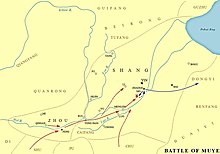Zhou conquest of Shang
| Battle of Muye | |||||||
|---|---|---|---|---|---|---|---|
 Battle of Muye |
|||||||
|
|||||||
| Belligerents | |||||||
| Shang | Zhou and its allies | ||||||
| Commanders and leaders | |||||||
| King Zhou of Shang | King Wu of Zhou | ||||||
| Strength | |||||||
| Historical Records: 530,000 Shang troops (not all loyal) 170,000 slaves (who later defected) ~Total 700,000 men Modern Estimates: 50,000-70,000 Shang Troops Many slaves |
Historical Records: 300 Zhou chariots 3,700 rebel principalities chariots 3,000 Zhou elite 45,000 Zhou footmen |
||||||
| Casualties and losses | |||||||
| All loyal Shang soldiers were slaughtered | Relatively minor | ||||||
| Battle of Muye | |||||||||
| Traditional Chinese | 牧野之戰 | ||||||||
|---|---|---|---|---|---|---|---|---|---|
| Hanyu Pinyin | Mùyě zhī Zhàn | ||||||||
|
|||||||||
| Transcriptions | |
|---|---|
| Standard Mandarin | |
| Hanyu Pinyin | Mùyě zhī Zhàn |
| Wade–Giles | Mu-yeh chih Chan |
Decisive Zhou victory
The Battle of Muye or Mu (c. 1046 BC) was a battle fought in ancient China between the Zhou and Shang. The Zhou victory led to the Shang being replaced and subsequently justified the doctrine of the Mandate of Heaven. The victory of the Zhou led to the fall of the Shang.
By the 12th century BC, Shang influence extended west to the Wei River valley, a region that was occupied by clans known as the Zhou. King Wen of Zhou, the ruler of the Zhou, who was a Shang vassal, was given the title "Count of the West" by the King Di Xin of Shang (King Zhòu). Di Xin used King Wen to guard his rear while he was involved in a south-eastern campaign.
Eventually Di Xin, fearing King Wen's growing power, imprisoned him. Although Wen was later released, the tension between Shang and Zhou grew. Wen prepared his army, and conquered a few smaller states which were loyal to Shang, slowly weakening Shang's allies. However, King Wen died in 1050 BC before Zhou's actual offensive against Shang.
Di Xin paid very little attention to these, as he viewed himself as the rightful ruler of China, a position appointed by the heavens, or perhaps because he was becoming engrossed with his personal life with his beautiful consort Da Ji, to the exclusion of all else.
King Wen's son King Wu of Zhou led the Zhou in a revolt a few years later. The reason for this delay was because King Wu believed that the "heavenly order" to conquer Shang had not been given and plus with the advice of Jiang Ziya to wait for the right opportunity.
Chinese civilians greatly supported King Wu's rebellion. In legend, Di Xin, initially, had been a good ruler. But after he married Daji, he became a ruthless ruler. Many called for the end of the Shang dynasty.
With Jiang Ziya as the strategist, King Wu of Zhou led an army of about 50,000. Di Xin's army was at war in the east, but he still had about 530,000 men to defend the capital city of Yin. But to further secure his victory, he gave weapons to about 170,000 slaves to protect the capital. These slaves did not want to fight for the corrupt Shang dynasty, and defected to the Zhou army instead.
...
Wikipedia
